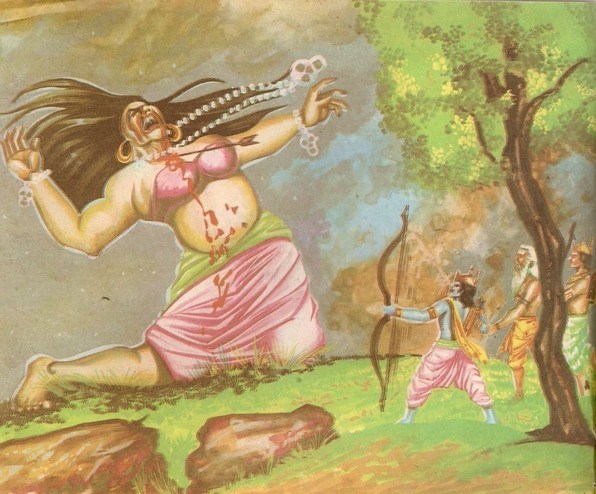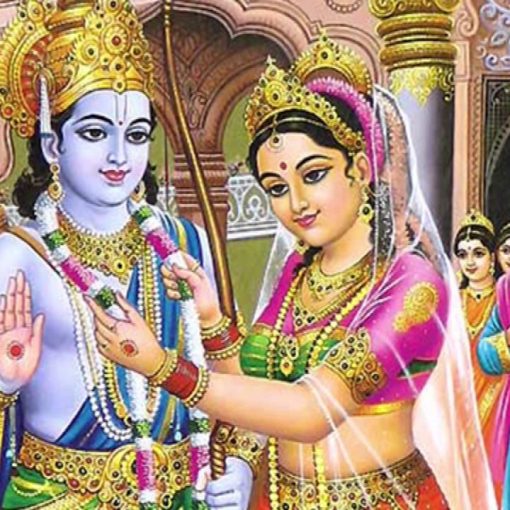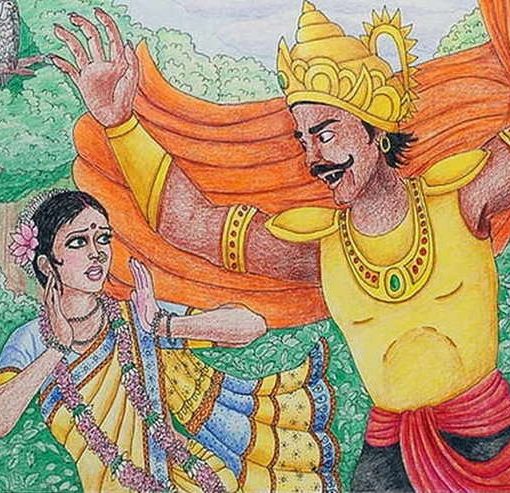Turning towards the princes, Viśvāmitra said, “The time has now come for the demise of the evil Tataka. You two princes should follow me to the place where she resides. Search her out and end her life immediately.”
Rāma replied with a smile, “Being a woman, O sage, how can Tataka have such power?”
Viśvāmitra knew that the virtuous Rāma was hesitant to attack a woman, but Tataka was no ordinary woman. The sage described her background. She had been born as the beautiful daughter of a great and powerful Yakṣa named Suketu. As a youth she was given a boon by Brahmā that she would possess the strength of a thousand elephants. She married the famous Yakṣa, Sunda, who was eventually killed as a result of a curse made by the sage Agastya. When Tataka learned of her husband’s death, she became infuriated with Agastya and, along with her son Maricha, she rushed towards the sage desiring to kill him. The sage stood his ground. He said to the two advancing Yakṣas, “As you act so wickedly may you both become demons! O Tataka, you shall lose your attractive form and instead become an ugly man-eating Rākṣasī!” Agastya then vanished from the spot.
Viśvāmitra raised his hand and indicated the path ahead of them. Tataka had turned the entire region into a desolate forest by her malevolent presence. She was always angry and would attack anyone who approached the area.
Having told the brothers Tataka’s history, the sage reassured them: “Although the scriptures state that a woman should always be protected and never attacked, in this case You need not fear any sin. The killing of Tataka is necessary for the good of society. One wishing to protect the afflicted must sometimes perform even a seemingly sinful act. This is the eternal duty of kings. O Rāma, You should not hesitate.”
Citing other historical examples of kings and gods who had killed evil women, Viśvāmitra urged Rāma to quickly kill Tataka.
Rāma accepted the sage’s order and grasped His golden bow. Standing ready for combat, He said to Viśvāmitra, “My father instructed Me on leaving Ayodhya that your order should be followed without hesitation. In obedience then to both his and your command I shall now face the fierce Rākṣasī. I wish to do good to the Brahmins and cows in this region, as well as to satisfy your holy self. Please point out to me the whereabouts of that wicked demon.”
Viśvāmitra led Them a little further into the wilderness. Rāma twanged his bowstring, which produced a terrific sound, filling the four quarters. All the forest animals were terrified by the noise.


Seeing her at a distance emerging from the forest in a terrible fury, monstrous in size and awful in appearance, Rāma said to Lakṣman. “Behold, My dear brother, this formidable and fearful Yakṣa woman. The very sight of this sinful wretch would break the hearts of the timid. Watch Me put her to flight with My sharp arrows. In truth, I do not really want to kill her, as she is a woman. I shall put an end to her strength by rendering her immobile and powerless, cutting from her body her hands and feet.”
As Rāma spoke, Tataka rushed towards him roaring, with her arms upraised. Uttering a powerful mantra, Viśvāmitra checked her progress, calling out, “May victory attend the Ayodhya princes!”


Rāma flew into a rage. He parried the rocks with a shower of shafts from His bow. He shot arrows with blinding speed. His bow appeared to be always bent into a circle. Taking razor-headed arrows He severed Tataka’s two arms, even as she came running towards him. Lakṣman also became furious. He released sharp arrows with deadly accuracy and sliced off her nose and ears.
The Yakṣa woman disappeared and rose up to the sky. Even though deprived of her arms, she used her sorcery to throw down more massive trees and boulders. Remaining invisible, she moved hither and thither, screaming all the while. Viśvāmitra saw the boys mystified by the Rākṣasī’s illusory powers. He realized They were holding back because Tataka was a woman. The sage called to the brothers. “Have done with Your tenderness! This woman should not be spared! Sinful and wicked, she thoroughly deserves death at your hands. Act swiftly to end her life before nightfall, as the demons are always more powerful after sunset!”


Having watched Rāma slay the demoness, the gods, headed by Indra, assembled in the skies and applauded. Celestial flowers rained down on the two princes. Acknowledging the gods’ pleasure, Rāma and Lakṣman modestly bowed Their heads. The thousand-eyed Indra said to Viśvāmitra, “All the gods are gratified with Rāma’s feat. O holy Brahmin, show Rāma your affection by giving to Him your knowledge of the celestial missiles. A great objective of the gods will soon be accomplished by Rāma with the use of these weapons.”
Indra was considering Viṣṇu’s desire that Rāvaṇa and his Rākṣasa hordes be annihilated. As he looked upon the mighty Rāma he knew that the time for the destruction of the Rākṣasas was imminent.
After Indra had spoken, the gods returned to the heavens and twilight fell. Embracing Rāma and Lakṣman, Viśvāmitra said, “Let us remain for the night in this forest. Freed from the curse of Tataka, it is now rendered so very peaceful and attractive. In the morning we shall continue on to my hermitage.”
The three of them rested for the night, praised by heavenly bards and singers who had assembled in the canopy of the sky.
The next morning Viśvāmitra remembered Indra’s words. He sat the two princes down and faced them. “Steady Your minds, O heroes, for I shall now tell You the knowledge of the gods’ mystic weapons, including even those presided over by the invincible Brahmā, Śiva and Viṣṇu. Equipped with this knowledge You will be able to forcibly bring under Your control even the hosts of gods and demons, including the Gandharvas and Nāgas, the powerful celestial serpents.”


Rāma accepted them with affection and asked them to personally appear within His mind whenever He thought of them. The personified missiles replied, “It shall be as You say.” Taking leave of Rāma, the weapons circumambulated Him with respect and returned to their own heavenly abodes.
After teaching the brothers the full knowledge of firing and recalling the weapons, Viśvāmitra finally said, “The instruction is complete. O glorious princes, we should now continue towards our destination.”
They moved on from that spot and soon saw in the distance a great cluster of trees, appearing like a mass of dark clouds on the horizon. As they came closer they saw it was a beautiful copse containing varieties of flowering and fruit-bearing trees. Sweetly singing birds filled the air and graceful deer moved about next to rivulets of clear water. Looking at Viśvāmitra, Rāma inquired, “What is the name of this place so pleasing to the mind? It seems we have arrived at the site of some holy hermitage. Can it be that we have now reached your own abode, O learned Brahmin?”
Although possessed of infinite knowledge, Rāma had fully assumed the role of Viśvāmitra’s student. He listened attentively as the sage smiled and told Him the ancient story of Bali and Indra. Once the immensely powerful King Bali, lord of the demons and enemy of the gods, seized the seat of Indra and began to rule over the universe. Becoming famous throughout all the three worlds of heaven, earth and hell, he remained in that position for a long time.
The gods had become perturbed and with Indra at their head they sought out Viṣṇu. The Lord then appeared as Vāmana, accepting the form of a Brahmin boy. On the plea of charity, He took from Bali the three worlds, restoring them again to the gods. Vāmana then remained for some time at this hermitage, known as the Siddha-ashrama, sanctifying it by His presence. Viśvāmitra concluded, “It is here that I have my dwelling, O Rāma. Let us go there now.”
Taking the two princes by the hand, the sage entered his hermitage. As he walked into the large compound he resembled a full and cloudless moon accompanied by two brilliant stars. There were numerous hermits moving about in that grassy enclosure. Some tended sacred fires, while some of the younger ones chopped wood or worked on constructing the large central altar meant for the main sacrifice. In some places groups of sages sat reciting the Sanskrit hymns of the Vedas, while elsewhere other sages cleaned and prepared sacrificial paraphernalia. Rāma and Lakṣman looked with interest upon the busy scene that greeted Them. Despite the bustle, an atmosphere of tranquility prevailed and the hermits glowed with ascetic power.
Seeing that Viśvāmitra and the princes had arrived, the hermits sprang up and paid their respects. They offered water and forest fruits to the two princes. It was late in the evening and long shadows stretched across the ground. The sacrifice would begin the next day. On Viśvāmitra’s order the hermits showed the two boys to a secluded cottage. One of the sages said, “Rest now for the night, and tomorrow, led by Viśvāmitra, we will go through the ceremony to consecrate our sacrifice. Surely our success is now certain because we see you two princes before us, equipped with every weapon and shining like the sun.”
The sages gazed with gratitude at Rāma and Lakṣman. They had been afflicted by the Rākṣasas for a long time and had prayed for deliverance. In his prayers and meditations, Viśvāmitra had understood the Lord’s plan. The sage had thus gone to Ayodhya, looking for Rāma. Now the divine prince had actually come to personally deliver the ascetics from their suffering. As they watched the two boys lie down to sleep, the sages were struck with wonder. In their hearts they offered worship and praise to Viṣṇu.
Before dawn the next morning the princes rose and went through Their daily rituals. After offering obeisances to Viśvāmitra, They sat down by the side of the sacrificial altar. Facing the sage with folded hands, Rāma asked, “O venerable sir, please tell Us when and where We can expect the evil Rākṣasas to appear?”
Viśvāmitra remained impassive, but the other hermits applauded the boys, seeing their readiness to tackle the demons. One of them replied, “Viśvāmitra is now observing a vow of silence, which he will keep for the next six days and nights, remaining awake throughout. At the end of that period, close to the completion of the sacrifice, the two demons will assail this area with all their force. But be ready, for the treacherous Rākṣasas could appear at any time!”
The princes were eager for a fight. They stood vigilantly by Viśvāmitra’s side as he sat silently meditating upon the sacrificial hymns. Rāma leaned on his great bow, which stood almost as tall as Him. Lakṣman held in His hand a shining blue sword, its golden handle impressed with bright gems.


Shrieking horribly, the Rākṣasas danced about, wreaking havoc. The hermits fell back, but this time they were not fearful. Viśvāmitra quickly stood up. It was time for these evil beings to receive their just deserts. They had defiled his sacrifice once too often. They would not do so again. Gathering the other ascetics, Viśvāmitra moved aside and ordered Rāma to attack the Rākṣasas.
Rāma became infuriated upon seeing the scene of devastation. He rushed forward toward the Rākṣasas, calling to His brother, “Watch now as I scatter these wicked demons who feed on raw flesh.”
Even as he spoke, Rāma continuously worked His bow. He sent swift arrows in all directions. The Rākṣasas were stunned; they had not expected any resistance. Some of them closed quickly on Rāma, covering Him on all sides. Rāma released arrows with deadly accuracy and speed. The Rākṣasas were cut to pieces. Rāma looked for Maricha. Seeing his huge form nearby, tearing at the sacrificial altar, Rāma invoked a celestial weapon. He placed it on His bow and, although still feeling furious, he calmly said to Lakṣman. “I shall release the Manava weapon, presided over by the father of the gods, Manu.”


Rāma and Lakṣman continuously discharged flaming arrows at the other Rākṣasas. Imbued with mystic power one arrow expanded into thousands. It appeared as if a continuous line of shafts was leaving Rāma’s bow, so fast was His movement. The Rākṣasas screamed in pain. Some of them vanished and others fell dead on the ground. Some entered the earth while others flew into the sky.
Regrouping, a large number of the demons rushed down from the sky towards the princes. They hurled lances, iron maces, massive rocks and blazing coals. Rāma and Lakṣman stood firm, parrying that shower of weapons with Their arrows. Tightly grasping His golden bow, Rāma said to His brother, “Fear not Lakṣman, for I shall now swiftly deal with these blood-sucking demons. They are wicked and merciless and always given to sinful acts. This indeed shall be the last sacrifice they defile.”
Having said this to His brother, Rāma moved with agility, evading the rocks thrown by the demons. He invoked the weapon presided over by the god of fire, Agni. Fired from Rāma’s fully extended bow, the weapon hit the Rākṣasa Subahu full upon the chest. His heart torn apart, he fell dead on the ground like an uprooted tree. Rāma then invoked the Vāyu-astra, the powerful wind weapon. He fired it and a roaring gale went towards the Rākṣasas. They were blown away like so many pieces of dust and debris. Those who were not killed by that weapon fled for their lives.
As the clamor of the battle died down, Rāma and Lakṣman felt their anger subside. They stood holding Their bows and looking at Viśvāmitra. The sage was delighted. He approached the princes. “I have accomplished my purpose, O mighty-armed heroes. You have perfectly followed your preceptor’s order. We can now continue the sacrifice for the good of the people.”


The many ascetics in the hermitage gathered around to congratulate the brothers. They led Them to a spacious cottage near the river. After showing the princes Their accommodation, the hermits offered Them forest fruits and cooked wild vegetables. Rāma and Lakṣman graciously accepted their offerings and then laid down for sleep, exhausted by the day’s events.
The next morning the princes came before Viśvāmitra and respectfully asked, “What other order of yours should we now carry out, O best among the Brahmins?”
Reference: Ramayana – Krishna Dharma Das https://www.vedabase.com/en/rkd/1/3





